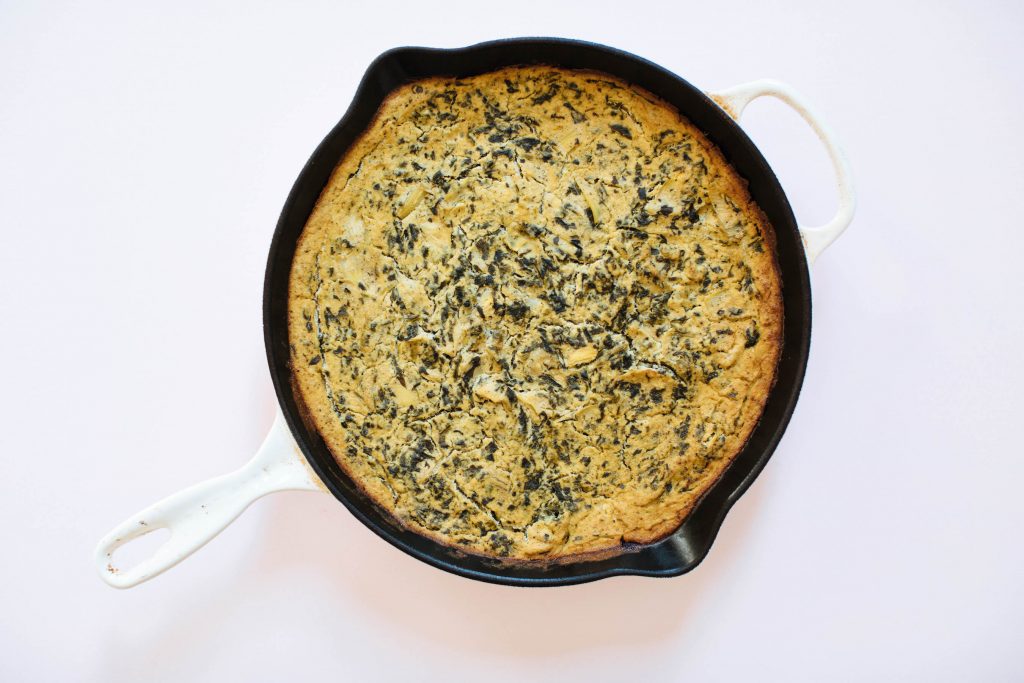
Creamy Spinach and Artichoke Dip actually contains no cream at all and tastes cheesy without the dairy.
This is a great healthy appetizer recipe that everyone can enjoy around the table. Creamy Spinach and Artichoke Dip is made with the obvious, spinach, artichokes, and pureed cashews, nutritional yeast, and delicious spices like garlic, cayenne, and onion.
If you’ve been looking for another dip to make on the weekend to last you all week, then add this one to the list! On that list, you might already have our NS favorites, Cashew Kimchi Dip, the Sweet Onion Dip, or the popular Classic Cashew Cheese. These are all crowd pleasers meaning you can make them once to last you all week, feed a crowd, and know that everyone who likes creamy spinach and artichoke dip will love this recipe too.
There’s a slight healthyish component to this recipe, the obvious being there’s no cheese here — cheese can be part of a healthy diet if tolerated well, it’s a source of fat — but why not add nutrients without sacrificing the texture or flavor?
That’s where the two secret ingredients come in to make the texture of this dip a huge win! Cashews and steamed cauliflower are pureed in a blender (easy peasy) with spices and nutritional yeast to create an insanely creamy and cheesy flavor. Truly, this sauce can be used on your favorite pasta or drizzled over roasted vegetables.
Cauliflower and cashews make this creamy spinach and artichoke dip so creamy, easy to make, easy to store and reheat, and a great way to sneak in a little more vegetables into the diets of your friends and family.
Can’t use cashews?
I get a lot of questions from our community about cashew allergies. Since cashews have one of the best flavors and textures for making up non-dairy dishes, that’s the preferred nut to use for this recipe. If you have an allergy, you can use hemp seeds instead and add about 1/2 cup in addition — the flavor will taste slightly more earthy and nutty, but the texture is still perfect!
Stripped
Cashews
Cashews contain plant-based protein, healthy fats, and minerals such as magnesium. Magnesium is a mineral in the body that plays a role in 300 cellular functions including muscle function, protein synthesis, blood sugar control, and blood pressure regulation.
It’s also been shown to help decrease PMS, and headaches, and it can also help with digestion and reducing constipation.
Digestion-friendly
In just one medium artichoke has nearly seven grams of fiber! That’s as easy as slicing one artichoke up and adding it to a salad, adding it to a stir-fry, to soup, or making a variation of a classic cashew cheese dip with artichokes to give it a fiber boost!
We know how important fiber is to our digestive system, but did you know there are different types of fiber? Eating both soluble and insoluble fiber are necessary to help move foods through your digestive system. In general, fiber is found mostly and most abundantly in fruits, vegetables, and legumes — if you’re eating a whole food diet you’re most likely getting plenty of fiber.
Depending on what your body needs, fiber can help put your bathroom breaks on a more regular schedule by either relieving constipation or helping to soak up extra water that could lead to diarrhea.
Artichokes have a special trait to them, these leafy bundles also provide prebiotics, which allows the good bacteria in your gut to flourish. You need prebiotics (and probiotics) to help your gut stay healthy, which we’re continuing to unravel the link between healthy gut and so many health issues from anxiety to reducing inflammation, and not to mention improving your overall well-being.
Studies show that artichokes can actually help control symptoms of irritable bowel syndrome, including stomaches, bloating, and frequent bathroom visit. Artichokes have also been shown to protect the liver, which is important for nutrient absorption and fat digestion.
